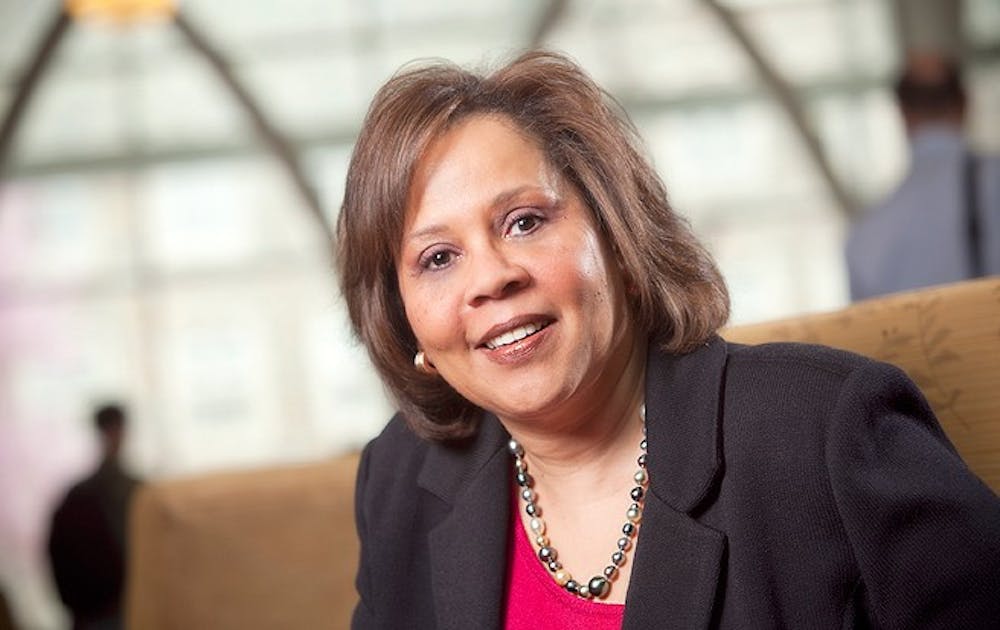Paula McClain, former chair of Duke’s Academic Council and political science professor, views the Graduate School as central to the University’s mission and reputation, and, as dean, she wants to raise its profile within the University.
The University announced last week that McClain’s position as dean of the Graduate School and vice provost for graduate education will be effective July 1. McClain was selected for the position based on committee recommendations to Provost Peter Lange and President Richard Brodhead. She will be the first black dean of a Duke school.
“[McClain] has a lot of experience,” Lange said. “She knows Duke very well, and she has a lot of respect from all of her colleagues. She has [already] been deeply involved in graduate education.” The committee, chaired by physics professor Calvin Howell, received 60 applications for the position after conducting a national search. 54 applicants were unaffiliated with the University. The search to fill the position began in December, after former Graduate School Dean Jo Rae Wright stepped down in October during her battle with breast cancer.
Wright passed away from cancer in January.
McClain will preside over more than 60 University departments and programs, composed of approximately 2,200 Ph.D. students, 600 master’s students and 1,000 faculty members. Although she will provide leadership, McClain wants to maintain [the] Graduate School departments’ autonomy.
“The graduate school has a very strong professional staff,” she said. “I anticipate that they’re going to continue doing the wonderful job that they have done in the past.”
As dean, McClain said she will focus on equalizing fellowships for graduate students from different disciplines, so all graduate students receive similar funding for the same period of time. McClain will also prioritize diversifying the Graduate School’s student body. She aims to help departments within the school identify qualified students from underrepresented groups for admission.
A leader and a mentor
McClain came to Duke in 2000 from the University of Virginia, where she served as chair of the Woodrow Wilson department of government and foreign affairs. Former colleague Richard McCarty, who currently serves as the provost and vice chancellor for academic affairs at Vanderbilt University, said that McClain’s public presence and leadership at UVA were notable.
In a time of severe budget cuts, McClain was a leader who mobilized other faculty members to emphasize the importance of higher education in the state, he said. As a dean at Duke, she can continue to make the case for graduate education, not only to students, but also to Congress in response to federal cuts to higher education.
McClain has also served as a strong mentor for graduate students and undergraduates considering graduate school in her role as the director of the Ralph Bunche Summer Institute, a mentorship program for minority students interested in doctoral degrees and careers in political science, Howell said.
“In many instances, faculty of color end up having a much wider impact because even if students aren’t working with them directly, they will often come for advice and counsel,” McCarty said. “She mentors the next generation of African American scholars.”
McClain’s research focuses on racial minority group politics, with an emphasis on minority political and social competition. She also studies urban politics, focusing on public policy and urban crime. Her research on relations between blacks and Latinos was recently cited by the New York Times following outcry surrounding the Trayvon Martin case.
“I don’t see my research as evocative in any way,” she said. “If it’s picked up in a public sphere, fine, but that’s not the goal of why I do the research that I do. I want to contribute to a broader body of knowledge.”
She has also been involved with several national political science organizations. McClain was president of the Southern Political Science Association from 2005-2006 and vice president of the American Political Science Association from 1993 to 1994, among other positions.
“I know a lot of people, and a lot of people know my work,” she said. “I’ve worked with national organizations... my reputation as a scholar is going to play very positively into my role as the dean.”
Search for a new dean
The committee charged with recommending candidates for the dean position included faculty representatives from several departments, in addition to individuals from the Nicholas School of the Environment and the School of Medicine, Howell said. Members agreed that the dean should be an academic leader and a scholar with national and international recognition. They also wanted the dean to have a deep understanding of graduate education, both on a national and Duke-specific level, and to have an appropriate background in managing an organization similar in size to the Graduate School.
The committee narrowed its pool of 60 applicants to eight individuals, all of whom were interviewed. Four of the eight were already University faculty members. After the interview process, the committee recommended three applicants—though it did not rank them—to Brodhead and Lange. Although all three would have been excellent deans in their own right, each offered a different style of leadership, Howell said.
The top three candidates also faced tests of “background due diligence,” Howell said. The committee conducted a poll in an effort to understand how each candidate was viewed publicly. In the past, McClain has been criticized for her involvement with the “Group of 88”—University professors who signed a controversial advertisement printed in The Chronicle following the 2006 lacrosse scandal. McClain’s involvement in the controversy did not cross a “threshold of concern,” Howell said.
Get The Chronicle straight to your inbox
Sign up for our weekly newsletter. Cancel at any time.
“She’s a political scientist and that’s what they do, they take a stance,” Howell said. “You’re not always on the right side of history, but as a scholar you have to have a voice.”

